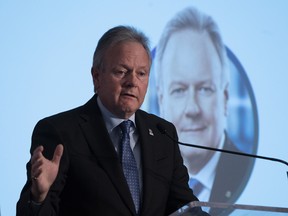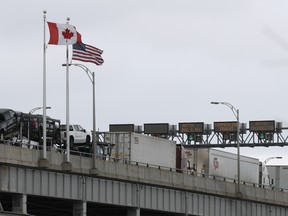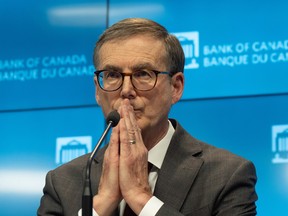Impact of levies could be worse than expected, says former Bank of Canada governor
Article content
Former Bank of Canada governor Stephen Poloz warned a Bay Street crowd Wednesday that the impact of United States President Donald Trump‘s threatened tariffs could be worse than expected because the Canadian economy is more “fragile” than when it met a best-case scenario in weathering the pandemic five years ago.
Article content
Article content
“We confront (these new) challenges from a weak starting point,” Poloz said in a speech at the Canadian Club in Toronto, in which he pointed to higher unemployment, “extremely weak” business investment and a slew of mortgage renewals at higher interest rates.
Advertisement 2
Article content
“The return of tariff man and his unpredictability will accentuate that weakness, whether the tariffs go into effect or not,” said Poloz, who was governor of the central bank from 2013 to 2020. “Today, we approach the Trump tariff shock with our economy in a very fragile position.”
In a worst-case scenario, he said, Canada could face both an economic slowdown and inflation, forcing the Bank of Canada to choose which is the more pressing threat on which to base interest rate decisions.
“Which one are you supposed to try and fix?”
Poloz said it is one thing to model the impact of a trade war, with some estimates suggesting it would be equivalent to a five per cent pay cut for Canadians, but, as with the response to the pandemic, models can’t account for everything.
“We can do arithmetic around the tariffs, but we can’t predict future behaviour — the human reactions that are underneath the things that models purport to capture,” he said.
Nevertheless, there are clear risks to Canadians and the strength of the dollar if Canada carries out a planned response of counter-tariffs, Poloz said, and he urged consideration of other responses, such as getting rid of inter-provincial trade barriers.
Article content
Advertisement 3
Article content
He also urged politicians to think about what is perhaps at the heart of Trump’s rhetoric: Canada paying its share of national defence under the North Atlantic Treaty Organization agreement.
This, he suggested, could be achieved through a new defence tax at the cash register, specifically directed towards men and women “in uniform,” and an agreement with the United States that would ensure Canada’s shipping and aerospace industries had a shot at military procurement contracts.
Lower-income Canadians could be reimbursed for the tax, perhaps in the neighbourhood of three per cent, in the same way they receive a GST rebate, he added.
“I think Donald Trump would say, ‘Now, that’s a teammate. Forget about all this other stuff that I’m talking about,’” Poloz said, acknowledging that while his plan might blunt the impact of a trade war, it could come under criticism for seemingly acquiescing to a “bully.”
On Wednesday, Liberal leadership hopeful Mark Carney, another former Bank of Canada governor, pledged, if elected, to meet Canada’s NATO target of two per cent of GDP by 2030 — two years ahead of the timeline set by Prime Minister Justin Trudeau.
Advertisement 4
Article content
In an interview following his speech, Poloz said the potential costs of any steps taken to mitigate the impact of the trade war must be weighed against the federal government’s expressed willingness to spend to support Canadians hurt by it.
“You could imagine things like CERB (the pandemic era Canada Emergency Response Benefit) or enhanced EI (employment insurance) — something that quickly helps people if they’ve lost their job because of the tariffs,” he said. “Separately, what I’m saying is, if we’re going to have (the equivalent of an across-the-board) five per cent pay cut, think about those as chips on the table (in a negotiation)… What are you willing to do to avoid losing that five per cent?”
Poloz acknowledged that dissolving inter-provincial trade barriers as an alternative to counter-tariffs is sure to be politically challenging, but said there is a blueprint for it in Canada’s founding.
Recommended from Editorial
-

Why 25% tariffs doesn’t necessarily mean 25% price hikes
-

Trade uncertainty a ‘tax on businesses’ as BoC mulls next move
“It is worth remembering that back in 1866, the United States walked away from its trade agreements with the provinces… What was our response then? Confederation. Imagine that,” he said.
“Our founding fathers thought they were creating a unified east-west free trade zone, so that we could reduce our dependence on trade with United States,” said Poloz. “The irony is almost too much for me to handle.”
• Email: bshecter@nationalpost.com
Bookmark our website and support our journalism: Don’t miss the business news you need to know — add financialpost.com to your bookmarks and sign up for our newsletters here.
Article content
Poloz says impact of tariffs could be worse than expected
2025-02-05 20:35:10







